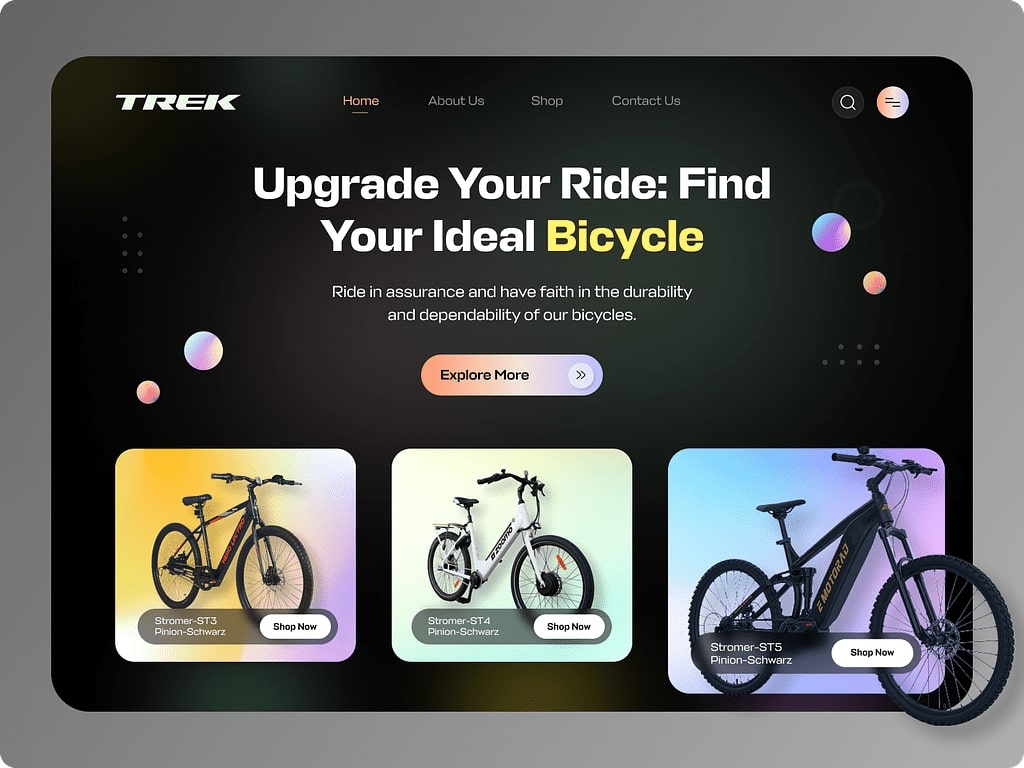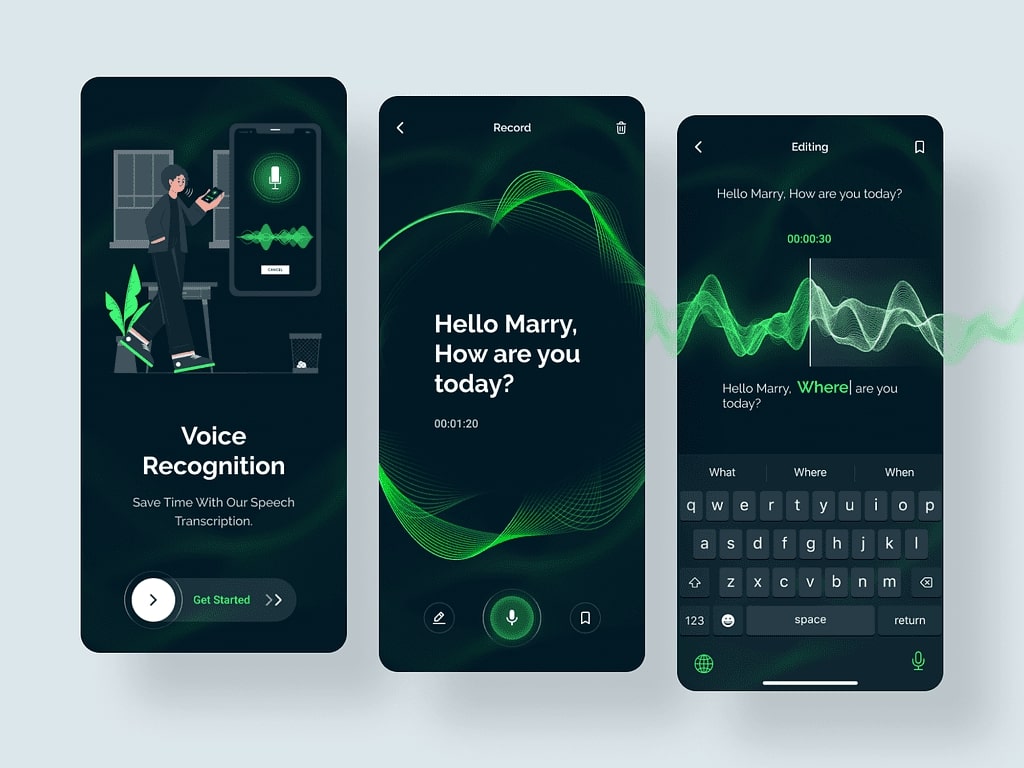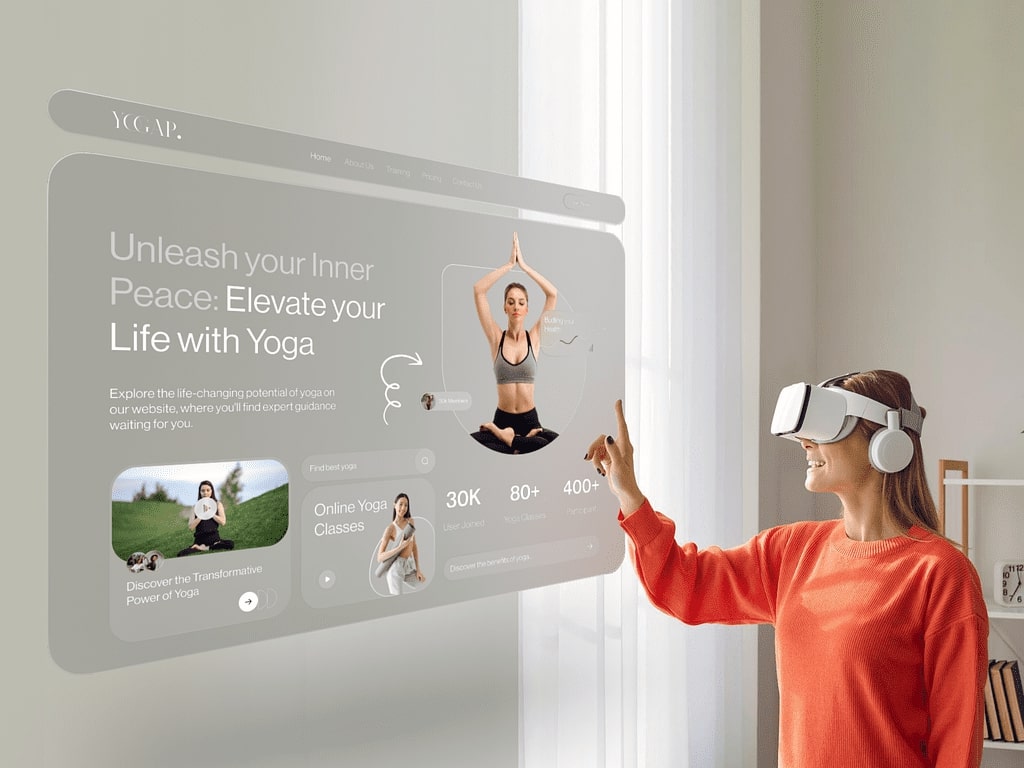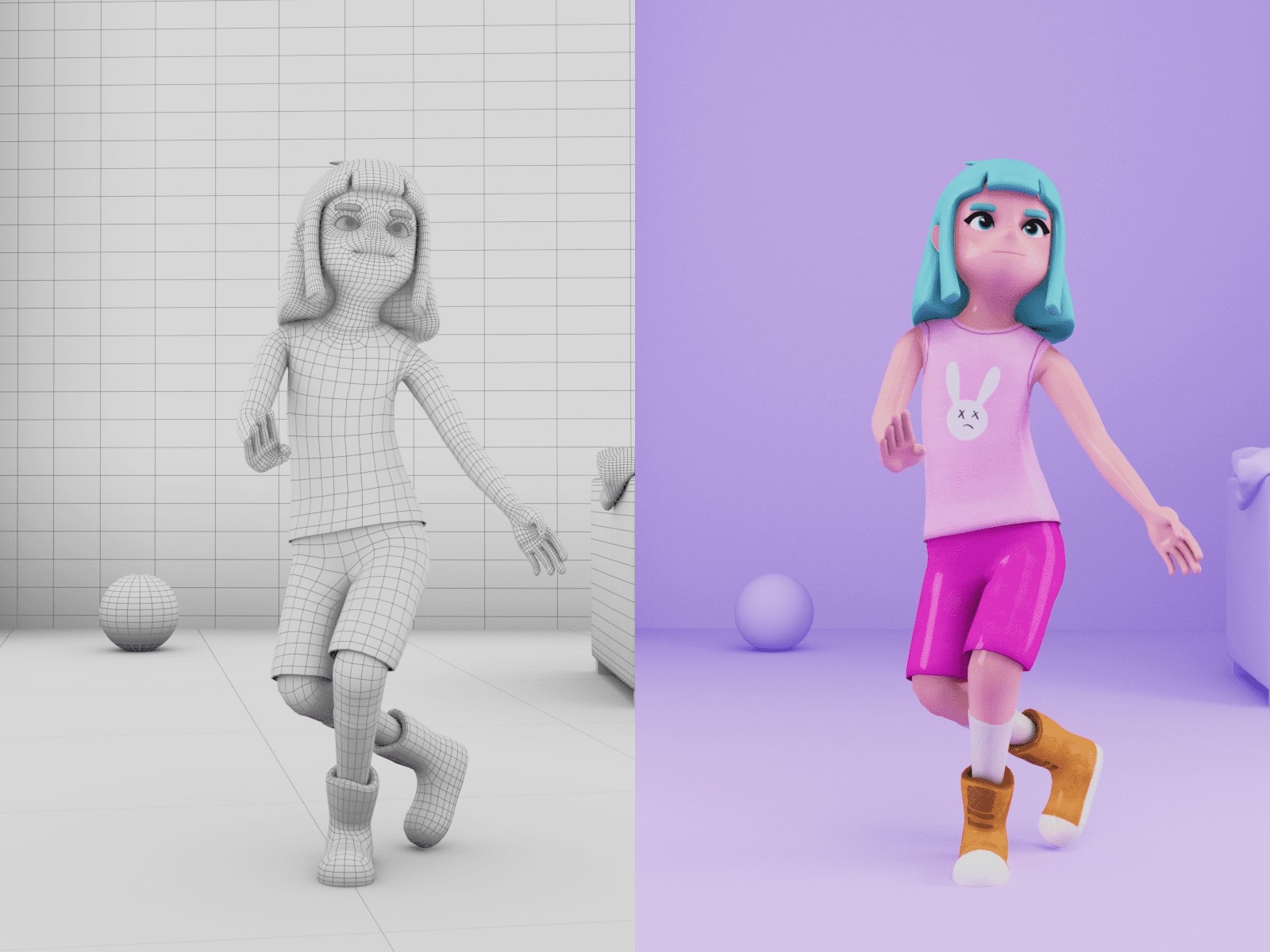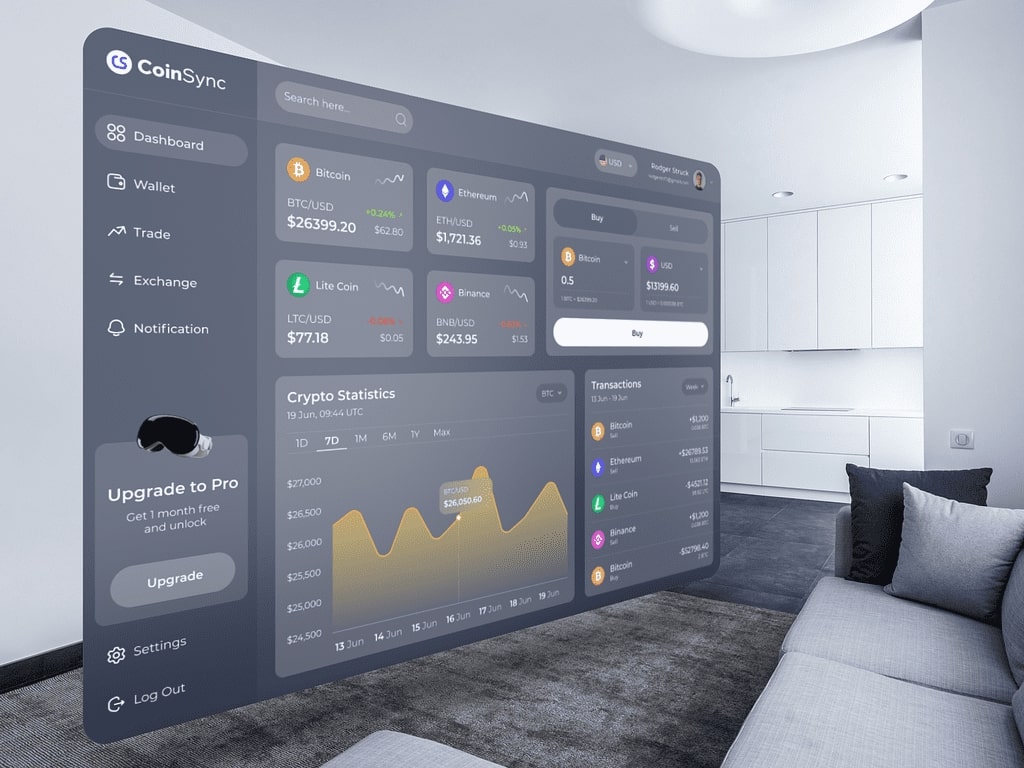10 UI/UX Design Trends That Will Be Roaring in 2025
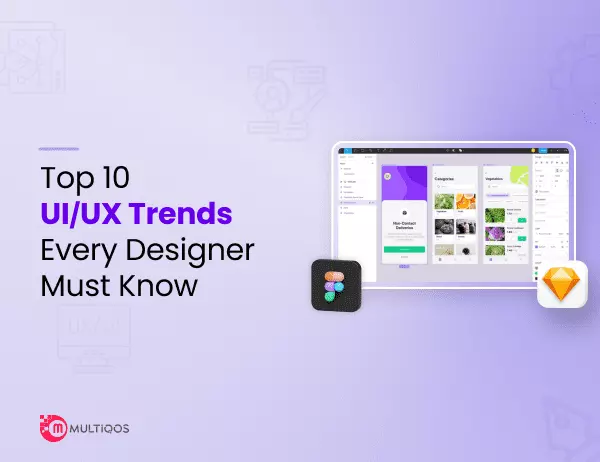
As we are entering into 2025, businesses are looking for what top UI UX design trends and predictions will work in the coming year.
You may have extraordinarily designed your app or website, but as the new technologies emerge into the market, the demand for latest UI/UX design also increases. Wondering why?
After the outbreak of Covid-19, the user needs have been drastically changed and majorly shifted to online shopping- by choice or by force. And to accommodate that need, businesses have quickly migrated their traditional business models to online platforms.
There are 1.13 million websites and 6 billion apps are available on the app store but out of which 82% websites are inactive and 4 out of 5 apps are abandoned by the users.
So here the real change is to stay ahead of the curve and also aim to capture and retain their audience’s attention by adopting the latest UI/UX design trends.
Several e-commerce giants have strategically embraced the latest UI/UX design trends, witnessing remarkable increases in conversion rates and user engagement.
And Amazon is one such e-commerce brand that is renowned for its customer-centric approach oftenly and continually refines its user interface and experience to keep their users coming back to the platform.
The role of cutting-edge UI UX design services in shaping the digital retail landscape, emphasizing that staying at the forefront of design innovation can translate into tangible business growth and customer loyalty. As the digital market continues to evolve, businesses that prioritize the latest UI/UX trends are not just keeping up; they’re setting the pace for the industry.
Top UI/UX Design Trends To Watch Out in 2025
Trend 1: Personalization
In the competitive market of 2025, businesses are increasingly recognizing the value of personalized user experiences as a direct investment in customer satisfaction and loyalty.
Tailoring content, interfaces, and themes based on user preferences and behavior not only help you build direct connection with the audience but also significantly increases user retention.
An Accenture report revealed that 90% of customers say that they are willing to shop from a brand that provides a personalized experience.
Furthermore, this strategic approach facilitates targeted marketing efforts, ultimately leading to improved conversion rates. In a crowded digital landscape, personalization stands out as a key differentiator, helping businesses build and maintain long-term customer relationships.
Trend 2: Dark Mode
The prevalence of dark mode in 2025 is rooted in its dual appeal of reducing eye strain and delivering a visually sophisticated aesthetic. As users increasingly prioritize comfort and style, businesses across platforms are embracing dark mode for its modern look and energy-saving benefits, making it a defining design choice.
Source: Bicycle Store Landing Page UI Design
Notably, studies show that a smartphone user spends average time on mobile apps is around 4 hours and approximately 82.7% of participants prefer using dark mode themes on their devices as it puts less stress on eyes.
In case, if your app or website is not yet supporting the dark mode, then users may quickly shift on the other options.
Trend 3: Neomorphism
Neomorphism emerges as a real UI/UX design trend set to lead in 2025, offering a perfect blend of realism and modern design aesthetics.
Recognizing its potential to create interfaces with a tactile feel, businesses are adopting Neomorphism to set a new standard for visually engaging and sophisticated user experiences.
This trend reflects a strategic move towards enhancing the user interface by incorporating elements that bridge the gap between the physical and digital realms.
Trend 4: Microinteractions
Microinteractions take the forefront in 2025, acting as the silent feature to deliver delightful user experiences. These are small but impactful moments of interaction, such as liking a post on Instagram or retweeting on Twitter, make using apps a breeze.
Employing micro-interactions in design, facilitated by hiring a UI/UX designer, becomes a simple yet smart move. Harnessing these subtle details ensures that user interactions are not only smooth but also contribute to an overall positive and enjoyable user experience.
Trend 5: Voice User Interface (VUI)
With 4.2 billion voice assistants in use, answering 93.7% of search queries, integrating VUI into design becomes a strategic move for accessibility and user convenience.
Source: Smart Voice Recognition App
This feature allows users to interact with platforms using voice commands, enhancing the overall user experience. From a business standpoint, implementing VUI can lead to increased user retention and satisfaction, attracting a broader audience, including those with varying levels of technological proficiency.
Trend 6: Augmented Reality (AR) Integration
AR is rapidly transforming various industries, with two-thirds of shoppers believing that AR technology can help them make better shopping decisions. Implementing AR features in UI/UX design opens up opportunities for creating unique and interactive brand experiences.
Source: YOGAP – Vision Pro Spatial Yoga Exploration UI
Whether in e-commerce or educational applications, AR provides immersive and personalized interactions, leading to increased user engagement, customer trust, and potentially higher conversion rates.
Trend 7: Adding 3D Elements
Moving beyond standard flat designs, incorporating 3D elements in UI design brings brands to life, adding depth and realism for a more engaging digital presence.
Source: Dancing Girl 3D Illustration
Businesses can leverage 3D elements to showcase products, features, or key messages in a visually compelling way, ultimately capturing user attention and reflecting a modern and innovative brand image. The result is increased user interaction and the potential for higher conversion rates.
Trend 8: Virtual Reality (VR) Integration
In the dynamic landscape of 2025, Virtual Reality (VR) integration emerges as a pivotal UI/UX design trend. Businesses are exploring the immersive capabilities of VR to create unparalleled user experiences.
Source: Cryptocurrency Dashboard – Apple Vision Pro
From virtual product try-ons in e-commerce to immersive storytelling in content platforms, integrating VR adds a new dimension to user engagement.
By providing users with a more immersive and interactive environment, businesses can enhance brand experiences, increase user retention, and stand out in a competitive digital space.
Trend 9: Variable Fonts
Variable fonts offer a practical solution for enhancing a brand’s visual identity. They allow for flexibility in typography, ensuring a consistent brand image across various platforms and devices.
From a performance perspective, variable fonts contribute to faster loading times, improving the overall user experience. For businesses, this means maintaining a strong and cohesive brand presence while optimizing digital performance, positively impacting user perception and brand loyalty.
Trend 10: Sustainability in Design
Incorporating sustainable design practices in 2025 aligns brands with socially conscious values, appealing to environmentally aware consumers. Beyond the ethical aspect, businesses can use sustainability in design as a unique selling point, differentiating themselves in the market.
Optimizing for energy efficiency and reducing digital waste not only contributes to a positive brand image but can also lead to cost savings in the long run.
Leveraging eco-friendly visual elements communicates a commitment to environmental responsibility, attracting a growing segment of socially conscious consumers.
How Does Latest UI/UX Design Trends Impacts Business Success?
Though you know the latest UI/UX design trends that are reshaping the look and feel of mobile or web apps. But what factors are actually pushing businesses to adopt these design trends. Why is there a surging demand for the latest UI/UX design trends in 2025?
Here are the key factors that are pushing businesses to look out for new design trends:
1. Technological Integration: Paving the Path for Innovation
In the rapidly evolving digital landscape, the integration of technologies such as Artificial Intelligence, Voice Commerce, Augmented Reality, and Virtual Reality is redefining user interactions.
Businesses recognize the need for UI/UX designers who can seamlessly integrate these cutting-edge technologies, creating compelling and intuitive digital experiences.
2. Mobile-Centric Dynamics: Shaping Exceptional User Experiences
As mobile applications continue to dominate the digital sphere, the demand for UI/UX designers escalates. Crafting responsive, user-friendly, and visually appealing mobile interfaces has become pivotal in delivering exceptional user experiences.
UI/UX experts play a crucial role in the realm of app development, ensuring businesses stay competitive in the mobile-centric landscape.
3. Continuous Evolution and Adaptability: Staying Ahead in Design Trends
UI/UX design trends are in constant flux, reflecting the ever-changing preferences of users. Recognizing the importance of adapting to these trends, businesses are hiring UI/UX designers to navigate new technologies and evolving design landscapes.
Industry leaders like Facebook, Google, Apple, and Instagram continually update their UI/UX to enhance user engagement. The continuous pursuit of learning and upskilling is not just a choice but a necessity for UI/UX professionals to stay ahead in this dynamic industry.
4. Business Imperative: Embracing UI/UX for Digital Success
The demand for the latest UI/UX design is fueled by the imperative to embrace technological advancements, cater to the mobile-centric user experience, and cultivate a workforce that thrives on continuous learning and adaptation.
As businesses recognize the pivotal role of UI/UX in shaping digital interactions, the need for skilled professionals in this field continues to surge. Adopting new design trends is not merely a choice but a strategic necessity for sustained success in the dynamic digital landscape.
Additional Benefits of Upgrading UI/UX Design
-
Evolving User Expectations and Engagement
In today’s dynamic digital landscape, meeting evolving user expectations and enhancing engagement is paramount. The latest UI/UX designs are crafted to captivate users, fostering prolonged interactions and boosting overall engagement.
Experts emphasize that a thoughtful UI/UX design is the key to ensuring user comfort and satisfaction. By understanding user needs, employing effective visuals, and optimizing based on feedback, businesses can create designs that resonate with customers.
-
Technological Advancement: A Competitive Edge
Technological advancement plays a pivotal role in maintaining competitiveness in a crowded marketplace. Upgrading design aligns businesses with contemporary trends, providing a crucial edge. The ripple effect of improved design extends to increased user satisfaction, as intuitive and aesthetically pleasing interfaces contribute to higher levels of user contentment, fostering loyalty and positive brand perception.
-
Reduced Bounce Rates: Retaining Potential Customers
Reduced bounce rates are a direct result of improved design, preventing potential customers from abandoning websites or apps due to frustration or confusion.
An adaptive UI/UX design not only accommodates new technologies but ensures seamless integration with evolving platforms and devices. This commitment to staying current enhances the overall brand image, resonating particularly with a tech-savvy audience seeking modernity.
-
Conversion Optimization: Streamlining User Journeys
The impact of a well-planned UI/UX design goes beyond aesthetics—it’s a powerful tool for conversion optimization. Intuitive designs streamline user journeys, optimizing conversion funnels and driving more effective calls to action.
Studies indicate that a well-executed UI/UX design can increase a website’s conversion rate by a significant margin, ranging from 200 to 400%.
-
Global Accessibility Standards: Inclusivity Matters
Global accessibility standards are another crucial aspect of contemporary design. Aligning with the latest trends ensures inclusivity, meeting accessibility standards, and broadening the user base.
The mobile-first imperative cannot be overlooked, with updated UI/UX designs ensuring mobile-friendly interfaces that cater to the growing user base accessing services through smartphones and tablets.
-
Data-Driven Decision Making: Empowering Business Insights
One of the key advantages of advanced UI/UX designs lies in facilitating data-driven decision-making. These designs empower businesses to collect and analyze data, enabling informed decisions based on user behavior and preferences.
As we look ahead to 2025, these valid reasons and logical benefits should serve as compelling incentives for businesses to explore and implement the top UI/UX design trends that are set to dominate the digital landscape.
How MultiQoS Can Assist You In Adapting To the Latest UI/UX Design Trends?
Knowing about the latest UI/UX design trends is not enough for you to achieve success. Your collaboration with the capable team of UI UX designers can be a real game-changer.
With MultiQoS, you will get the assurance to stay ahead in UI/UX design trends as they never adopt a one-fit-to-all strategy. Instead, they conduct thorough trend analysis, tailor integration to your brand, and prioritize a user-centric approach.
In addition, they bridge a gap between design and development teams ensuring seamless implementation. Embracing agility, MultiQoS adapts swiftly to emerging trends, refining designs through iterative prototyping.
They empower your team with training and provide continuous support, ensuring sustained excellence in your digital presence. With MultiQoS, your UI/UX is not just on-trend; it’s a strategic edge for your business.
Conclusion
Hopefully this blog has given you detailed knowledge of the latest UI/UX design trends. But knowing these trends are not enough, you need to find a UI/UX designer with right skills and expertise to accommodate it flawlessly.
If you are still confused about how to upgrade your website or app and what UI/UX design trend will suit your requirements then MultiQoS will be your ultimate platform to get professional assistance and solution. The experts will analyze your product and suggest you the best fitted latest design trends to make it work in 2025.
If you still have any doubt on how to make your app look modern and what trends to be integrated then contact us for more details!
Looking to Hire Expert UI/UX Designer?
Our UI/UX designer utilizes scalable, sustainable, and futuristic solutions to transform creative and extraordinary ideas into reality.
FAQ on UI/UX Design Trends in 2025
Staying abreast of UI/UX design trends in 2025 is crucial for businesses aiming to capture and retain their audience’s attention. These trends not only enhance visual appeal but also drive user engagement, satisfaction, and ultimately contribute to business growth.
Intuitive and aesthetically pleasing interfaces contribute to higher user satisfaction, fostering loyalty and positive brand perception. By understanding user needs, employing effective visuals, and optimizing based on feedback, businesses can create designs that resonate with customers.
Upgrading design aligns businesses with contemporary trends, providing a competitive edge in a crowded marketplace. The latest UI/UX designs ensure that businesses remain technologically relevant, appealing to a broad audience that values modernity.
Improved UI/UX design directly reduces bounce rates by preventing potential customers from abandoning websites or apps due to frustration or confusion. An adaptive design not only accommodates new technologies but also ensures seamless integration with evolving platforms and devices.
UI/UX design is a powerful tool for conversion optimization. Intuitive designs streamline user journeys, optimizing conversion funnels and driving more effective calls to action. Studies indicate that a well-executed UI/UX design can significantly increase a website’s conversion rate, ranging from 200 to 400%.
UI/UX designs that align with the latest trends ensure inclusivity, meeting global accessibility standards and broadening the user base. Additionally, a mobile-first imperative ensures that designs are mobile-friendly, catering to the growing user base accessing services through smartphones and tablets.
Get In Touch

